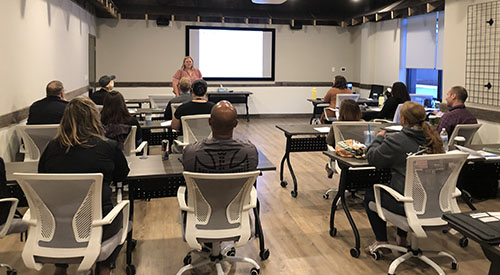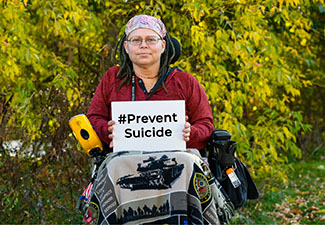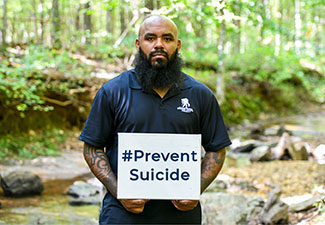How Can You Help Reduce Suicide?

What if asking someone about suicidal thoughts could make the difference between life and death? Would you ask? How do you know when and how to ask?
Raising awareness of suicide and how to talk to those dealing with thoughts of suicide are the main principles behind Applied Suicide Intervention Skills Training (ASIST). Wounded Warrior Project® (WWP) is one of the many facilitators of this important training. ASIST is taught worldwide and is considered the gold standard in suicide prevention training.
ASIST workshops combine classroom-style education with practical application in a safe environment. Participants discuss attitudes surrounding suicide, including their own possible bias, and learn the importance of talking about suicide. WWP™ has conducted ASIST workshops since 2011. WWP provides this critical training for community and corporate partners, employees, other veterans service organizations, health care providers, and community organizations, such as police and fire departments.
Learning the Techniques to Help Others
ASIST training includes practice interactions that utilize the PAL (Pathway for Assisting Life) model, which focuses on building skills for connection and understanding. PAL model interactions encourage people to ask clear and straightforward questions about suicidal thoughts and to gain a deeper understanding of a person’s struggles.
Participants use PAL in practical and practice-oriented ways, both with facilitators and one another. This encourages participants to become more prepared and confident with the skills they’re learning in a safe environment.
“We aim to train as many people as possible in our communities to ensure a veteran who might be struggling is more likely to interact with someone who is equipped to navigate a conversation about suicide,” said Lindsey Gray, senior suicide prevention specialist for WWP. “That ranges from the question of how to ask directly to helping navigate conversations about safety and support.”
Risk Factors and Signs to Watch For
There is no single cause that leads to suicidal ideation or suicide, and it is usually the result of many factors.
Risk factors can include:
- Post-traumatic stress disorder (PTSD)
- Military sexual trauma (MST)
- Homelessness
- Substance use
- Increased health problems and/or pain
- Relationship issues
- Unsecured firearms
- Sleep challenges
- Rurality
- Hopelessness
Signs someone may be thinking about suicide may include:
- Excessive substance use.
- Not caring about appearance or abstaining from daily grooming habits.
- Engaging in reckless behavior.
- Isolating from family and friends and avoiding activities they used to enjoy.
- Comments like, “Some days I just don’t want to wake up,” should be taken seriously and prompt a conversation.
Signs could also present themselves in different ways for different people. For some, it could be excessive sleeping, others not sleeping; or overeating for some and not eating for others.
“The most important thing we can do is find a way to respond any time suicide is discussed in a caring/empathetic way, to always take it seriously, and to trust our gut if it’s telling us something is wrong,” Lindsey said.
Tips for Prevention
Connection and support. Connectedness and a sense of belonging are vital to a person’s mental health and overall well-being. Wounded Warrior Project helps warriors, family support members, and caregivers build connections with others through peer support and alumni events, connecting them to like-minded individuals. Among warriors who participated in WWP connection events, 96% reported feeling socially connected to their peers, and 95% said they have people they can depend on.
Speak up … and listen. If you’re concerned someone might be thinking about suicide, say something. Listen to support them, not to fix their problems. Don’t respond in a judgmental way. It’s likely a difficult conversation, so practice asking directly about suicide to become more comfortable addressing the issue. Sometimes, people need to be seen and heard, and knowing someone is there to listen and care can make a big difference.
Create safe environments. Reducing access to lethal means for someone dealing with suicidal thoughts could reduce suicidal risks, especially in the veteran community. The Department of Veterans Affairs (VA) reported that 72% of veteran suicides were firearm-related, which is 20% higher than firearm-related suicide rates for non-veterans (59%). Secure firearms or remove them from the premises if someone you know is dealing with suicidal thoughts.
Build a Support System: Have a list of friends or family you can contact in an emergency or if you need to talk. WWP warrior Jake Norotsky created the “3 Up, 3 Down Challenge” to help veterans connect and avoid feelings of isolation. By checking in on one another regularly, it’s easier to notice if something is wrong or if someone is having a hard time.
Know how to get help. Familiarize yourself with suicide support options, including the National Suicide Prevention Lifeline and other suicide prevention resources in your community. WWP also has free mental health programs designed to support warriors, family support members, and caregivers in improving their mental well-being. WWP programs are also designed to promote protective factors, such as connection and belongingness, and reduce risk factors, such as decreased physical activity, financial stressors, poor sleep, and chronic pain.
Remember, prevention is possible.
The most important thing is that warriors know they’re not alone. There’s strength in seeking help.
If you, or someone you know, need support, you can call, text, or chat with the National Suicide Prevention Lifeline at 988 or contact the Crisis Text Line by texting "TALK" to 741741.
Contact: — Paris Moulden, Public Relations, pmoulden@woundedwarriorproject.org, 904.570.7910
About Wounded Warrior Project
Since 2003, Wounded Warrior Project® (WWP) has been meeting the growing needs of warriors, their families, and caregivers — helping them achieve their highest ambition. Learn more.


